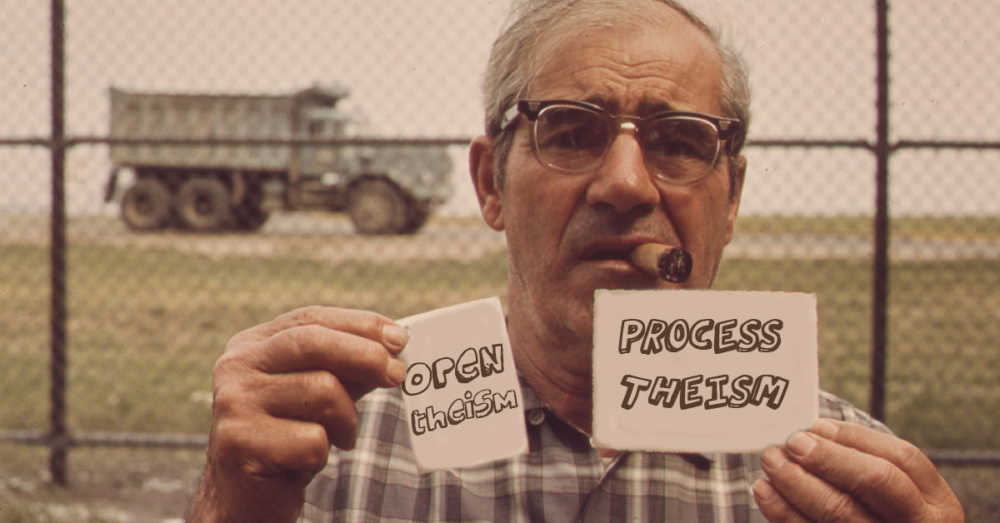We run our website the way we wished the whole internet worked: we provide high quality original content with no ads. We are funded solely by your direct support. Please consider supporting this project.

Process Theology & Open Theism: What’s the Difference?
Question: When ReKnew talks about Open Theism is it a mistake for people to equate it with Process theology, and if so what are the defining differences?
I guess I am starting to lean toward Dr. Boyd’s thoughts for all things theologically egg-heady, so I thought I would ask the question. Your ministry has been freeing for me, and has helped to save my faith after my son had cancer. I only joke because I feel very close to you guys even though we have only met in passing in a very crowded coffee shop and after a couple of sermons that hit me so hard I was at a loss for words.
Answer: Thanks for the kind words of affirmation. I wrote my doctoral dissertation on Process thought (Trinity and Process) where I critiqued the metaphysics of Charles Hartshorne and tried to demonstrate that one can adopt a system that has all the explanatory power of Process Thought (PT) without its unorthodox implications. The unorthodox implications are these.
- In PT, God exists eternally in relation to a non-divine world. So PT denies “creation ex nihilo”
- In PT, God is bound to metaphysical principles that govern both God and the world. So God isn’t able to really interact with the world as a personal being. God must always, of necessity, respond in ways that the metaphysics of the system stipulate. This means…
- In PT God can’t intervene in unique ways, like personally answering prayer
- In PT God can’t intervene and perform miracles
- In PT God can’t become uniquely embodied, as he is in Christ.
These are pretty serious shortcomings. I hope it’s clear that PT has got little in common with Open Theism other than that we both believe the future is partly comprised of possibilities. But even here there is a major difference. In Open Theism, God chooses to create a world with an open future, while in PT God has created of necessity.
I am very concerned that so many progressive thinking evangelicals are flirting with Process Thought. It’s really not a friendly home for anything like orthodox Christianity. While many find the dynamic and relational ontology of process thought, compelling—I can see how this is attractive— the intrinsic nature of the system is hostile to the Christian faith.
If you want to go deeper on this topic, my book Trinity and Process seeks to clarify all that’s positive with PT while avoiding all that’s negative. For a succinct summary of some of the shortcomings of PT, see chapter 9 in my book Satan and the Problem of Evil.
Category: Q&A
Tags: Open Theism, Process Theology, Q&A
Topics: Open Theism What it is and is not
Related Reading

What is the significance of Isaiah 5:3–7?
The Lord describes Israel as his vineyard. Referring to himself, he says that the owner of the vineyard loved his vineyard and did all he could to care for it. “[H]e expected it to yield grapes, but it yielded wild grapes” (vs. 2). Then the Lord asks, “What more was there to do for my…

What is the significance of Jeremiah 42:9-16?
Through Jeremiah the Lord tells Israel “If you stay in this land, I will build you up and not tear you down; I will plant you and not uproot you, for I have relented concerning the disaster I have inflicted on you” (vs. 10). Then, a few verses later, he says, “However, if you say,…

Summer Q&A!
Greg Boyd and Paul Eddy recently hosted a Summer Q&A for all three services at Woodland Hills Church. If you’ve ever wanted to sit and listen to these guys talk about a wide range of topics off the top of their heads, this is your chance! Good stuff folks! Our friend Jesse Ward was kind…

How do you respond to Judges 9:23?
“…God sent an evil spirit between Abimelech and the lords of Schechem; and the lords of Shechem dealt treacherously with Abimelech.” (cf. 1 Sam. 16:14; 1 Kings 22:19–23). Some compatibilists cite this passage to support the view that evil spirits always carry out the Lord’s will (though they contend that God is good for willing…

Confronting Divine Determinism
Part of the fallen human condition inclines us to shirk our moral responsibility and accept that everything is predetermined, whether by God, the gods, fate, or blind chance. Various forms of determinism have been prevalent in most primitive religions, in much ancient philosophy, in most forms of Islam and even, most surprisingly, in much traditional…
